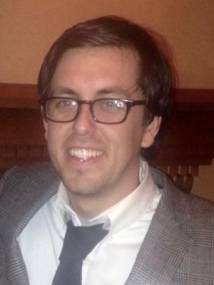To become a better writer, it’s the thought that counts

For NYU Wagner’s Thom Blaylock, good writing comes in many guises, even splattered by misplaced commas and misspelled words.
A Clinical Assistant Professor of Public Policy, he has taught communications at Columbia University and worked as an editor, consultant, and freelance writer. He researches the teaching of writing—how to bring out the best in students, no matter if their prose is polished or clunky, or whether they start an assignment with a tight outline or a stream of consciousness.
Since September, Professor Blaylock has run a lively writing workshop within the Introduction to Public Policy core course, giving Wagner students a chance to work on their prose. The semester-long course has eight sections over Fall and Spring and 240 students. Three other courses also have brought in Blaylock to teach his four-week module.
Interestingly, the form that Blaylock teaches in his workshop is the op-ed, a departure from the statistics-buttressed academic research paper and memo more familiar to Wagner’s graduate students.
“I like op-eds for teaching writing,” he explains. “They’re short, they require that you translate data and ideas to a broader audience, they force you to make and support a single position, and they provide you with an important advocacy tool.”
Blaylock gives an hour-and-a-half lecture at the outset. He provides a set of supplemental videos and podcasts, which he produced. Students choose a topic, study up on a publication to aim for, and draft their op-ed. Coaches from Wagner’s Writing Center lead workshops of five or six students to hone publishable pieces.
So far, several students’ articles have found their way into newspapers and magazines. Op-ed topics have spanned issues of healthcare, the urban built environment, large- and small-scale management challenges, local politics on the coasts as well as in the Midwest and the South, and international problems. They have examined identity, economic hardship, immigration policies, and NYU-specific challenges for students. The Wagner Review, the school's student-run academic journal, will also publish many of the students’ articles this spring.
The workshops not only offer tips for students to adapt to their own approaches, but also insights into common writing challenges. Students are given freelancer tools, such as a media contact list, provided by the OpEd Project. He encourages students to slow down, write repeated drafts, and avoid worrying too much about grammar. He encourages them to dig deeper into their research. For when it comes to writing, he emphasizes, it’s the thought that counts.
“We have very smart students. If they give it enough time, they can master the form: drive home an argument, offer evidence, acknowledge another point of view, and write a strong conclusion,” Professor Blaylock says. “It’s amazing for our students if they can walk out of here with a published piece that turns them into an ‘expert’ in the eyes of a potential employer.” But mainly, the communication skills can transfer easily to other forms of writing and communicating useful in their education and careers.
The “Op-Ed Event” within Intro to Public Policy is actually just one piece of a larger strategy Blaylock is helping to implement schoolwide. He has revamped the Wagner Writing Center and trained 10 current students as expert communications coaches who offer tutoring to other students at any point in their process. “The goal is to provide all the help we can while also building capacity in-house,” he says. “For years our Writing Center was staffed exclusively by professional writers. They were incredible, but they were expensive and only a select few students could access them.”
Now, he says, “We are trying something new: train the best writers we have here as communications instructors and give them the tools to tutor, coach, and provide feedback. We pay our own students and vastly expand capacity. We went from around 80 Writing Center appointments per semester to more than 400.”
Consistently strong writing, and thinking, remains the goal.
“We are a school of public service with great thinkers. One of our most important jobs is to help clarify those thoughts and get them out into the world,” asserts Professor Blaylock.